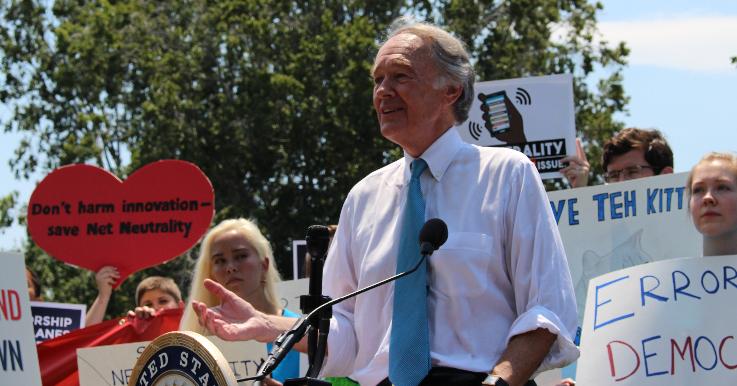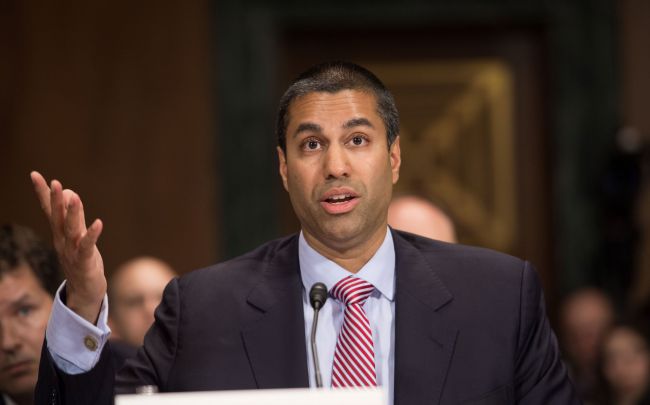50 senators want to overturn the FCC's plans to kill net neutrality, but chances are slim
What happens next?

On December 14, the FCC voted 3-2 to overturn the 2015 regulations that placed broadband and mobile under Title II of the Telecommunications Act, which had given the FCC the legal standing to more comprehensively regulate ISPs. As he overturned the 2015 Open Internet Act, FCC Chairman Ajit Pai cheekily called the reversal "protecting internet freedom," even though the Title II protections let the FCC expressly forbid anti-consumer practices like throttling and paid prioritization for certain data.
Democrats in the Senate, however, don't seem to agree with Pai's characterization. All 49 Democratic senators (including independents Sanders and King) have put forward a legislative measure to override the FCC's decision, with the support of Republican Susan Collins bringing their number to 50. With one more vote, the Senate will be able to pass a resolution of disapproval aimed at the decision of Pai's FCC.
So what does that mean? If the resolution picks up another vote, what happens to net neutrality?
A resolution of disapproval carries more weight than a frown and a finger wag. Via the Congressional Review Act of 1996, "if Congress passes a joint resolution disapproving the rule, and the resolution becomes law, the rule cannot take effect or continue in effect." Congress essentially has 60 legislative days to consider and overturn rules from federal regulatory agencies with a simple majority vote. If a disapproval resolution is passed, "the rule may not take effect and the agency may issue no substantially similar rule without subsequent statutory observation." It's a bit more complex than that—the president can veto the resolution, and the timing of the resolution votes works a bit differently in the House and the Senate—but the gist is, Congress has the power to overrule the FCC's regulations.

One other key bit: "The agency may not reissue either that rule or any substantially similar one, except under authority of a subsequently enacted law." This means that if a joint resolution passes reversing the FCC's decision, the FCC can't simply rename its "Restoring Internet Freedom Act" to the "We're Definitely Protecting the Internet Act!" and resubmit it. Once those rules are out, they're out, until Congress passes a new law to enable them. But how likely is that to happen?
Unfortunately, it's a longshot. Susan Collins is one of few Republicans to recently side with Democrats on some issues. Another, Alaska's Lisa Murkowski, has said she believes the FCC's deregulation decision was the right one. John McCain stated his disapproval of the FCC's 2015 decision to shore up net neutrality protections by classifying broadband as a Title II service.
With only 50 supporters, Vice President Pence would likely vote against the disapproval measure, so it almost certainly needs the support of one more Republican senator. And even if the measure does get one more supporter and passes the Senate, remember that this needs to be a joint resolution. It goes to the House next, where Republicans have a stronger majority. That makes the resolution's passage even less likely. And even if it passes the House, it's a likely target for a presidential veto, which requires a two-thirds vote in Congress to overturn.
Keep up to date with the most important stories and the best deals, as picked by the PC Gamer team.
Every Senate Democrat has now signed on to my CRA to restore #NetNeutrality. We’re all in for a free and open Internet. With just one more Republican vote, we can pass the CRA in the Senate. https://t.co/J2VJXcKtXSJanuary 16, 2018
That's probably not happening, which means the Restoring Internet Freedom Act is likely to go into effect. You can read our breakdown of what net neutrality means to PC gamers, and how deregulation may affect it, right here. This likely won't mean immediate changes to how you use and pay for the internet, but it will almost certainly mean gradual ones.
As Ars Technica has pointed out, Comcast conveniently removed its pledge "Comcast doesn't prioritize internet traffic or create paid fast lanes" last April, on the same day Pai announced his plans to repeal net neutrality regulations. And with the regulations gone, there's nothing binding in place to stop Comcast, Verizon, and other ISPs for implementing internet fast lanes, paid prioritization, and other anti-consumer practices.
In other words, unless the Senate's resolution of disapproval manages to become law against heavy odds, it's a great time to be an Internet Service Provider in the United States. It's not such a great time for everyone else.

Wes has been covering games and hardware for more than 10 years, first at tech sites like The Wirecutter and Tested before joining the PC Gamer team in 2014. Wes plays a little bit of everything, but he'll always jump at the chance to cover emulation and Japanese games.
When he's not obsessively optimizing and re-optimizing a tangle of conveyor belts in Satisfactory (it's really becoming a problem), he's probably playing a 20-year-old Final Fantasy or some opaque ASCII roguelike. With a focus on writing and editing features, he seeks out personal stories and in-depth histories from the corners of PC gaming and its niche communities. 50% pizza by volume (deep dish, to be specific).

